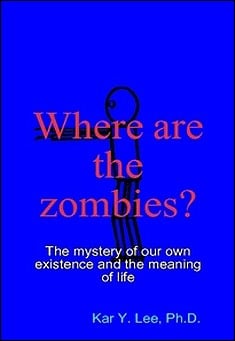What is a p-zombie? Is there afterlife? What is the purpose of our existence? Can computers and robots be conscious, and wake up one day to ask this very same question? This book is an intriguing exploration on the nature of the conscious mind. If there is afterlife, it is not the kind of afterlife people usually think of. These are all related to the question of why we are not p-zombies. Strange? Read on...
Excerpt:
This is not your typical zombie book.
Zombies depicted in popular movies like “Day Of The Living Dead”, “Night Of The Living Dead”, and other similarly titled ones all have this type of partially deformed faces and this mindless gaze. These slowly walking brain dead flesh eaters are supposed to be unconscious killing machines capable of doing great damages to anyone in their path.
However, this book is not about them.
This book is about another type of zombies.
Think about a medical doctor who, during one of his sleepwalking episodes, performed an accurate diagnosis on his patient, with normal doctor-patient conversation carried out, and then had no memory or recollection of whatever happened afterward (except the handwritten notes jolted down by the doctor during the diagnostic session). One can argue that the mind of the doctor was not even there when he performed the diagnosis. He was in an autopilot mode without the involvement of his consciousness. When a person is functioning without the involvement of his own consciousness, we have an example of a phenomenal zombie (or philosopher’s zombie).
This is the type of zombies that we are going to talk about.
Despite being unconscious and mindless, phenomenal zombies, if exist, can have properly functioning brains. They may even have very good brains, rivaling those of our smartest. They can think, unconsciously. They can even write poems, unconsciously. They can do everything we can do. The only difference is that they are mindless and are not conscious of what they are doing. It is all signals going around in their brains that are causing all these behaviors.
Here is the question: Can someone with a perfectly functioning brain be actually mindless?
If the answer is yes, then we will have to ask, what is the mind for?




